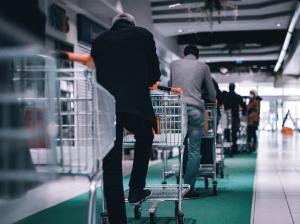You are here
- Home
- What in the world is going on?
What in the world is going on?
2 May 2020

Researchers at The Open University are using their skills in social sciences and global studies to learn lessons for our future after COVID-19.
How does COVID-19 change our society and social, economic and political worlds, now and for the future? How can we adapt, and are there things we can learn and take with us when we come out the other side?
Some of the minds best equipped to answer these questions have joined forces to launch Social Scientific Research in the time of COVID-19, a series of informed but accessible blogs, probing the pandemic from multiple angles.
They are the researchers in The Open University’s School of Social Sciences and Global Studies (SSGS) who specialise particularly in those areas of our existence now being changed and, in some cases, devastated by COVID.
“COVID 19 has turned the world upside down. We as researchers have a responsibility to use our expertise to try and make sense of it,” says Professor Sophie Watson, one of the academics leading the initiative.
“Most of our group have ongoing research related to the issues that COVID has thrown up, whether it is family life, violence, communities and public space, migration, local and global economies, policing, ethics, food production or the role of government.”
SSGS is the most diverse school in the university’s Faculty of Arts and Social Sciences, its research feeding into OU courses in subjects ranging from Criminology to Politics to Environmental Science. It includes two strategic research areas, in International Development and Inclusive Innovation and Governance and Citizenship.
The pandemic has had a big impact on ongoing research in many of these fields, with many projects being paused while academics re-think research methods and methodologies to incorporate social distancing.
They are also having to re-think their ethical positions – as another of the series’ champions, Professor Umut Erel, explains:
“We are having to ask, is there a potential for harm to our participants? Does the topic of the research justify taking their time and energies away from coping with the crisis situation we are in?”
They are also alive to the danger of being seen as ‘standing on the sidelines getting mileage out of other people’s misery’, as Professor Sophie Watson puts it, but by being mindful of these ethical pitfalls, they hope to avoid them.
The bottom line is: the more we can learn about COVID-19 in all its aspects, the more we can make effective plans to change the way we do things, for the better. Professor Umut Erel is already contemplating some of the changes:
“Our research projects may be very local, but we have all seen how local issues can be of global significance. This situation challenges us all to think in a more globally connected way.”
Photo by Adrien Delforge
Share this page:
Monthly Archive
- March 2024 (1)
- November 2023 (1)
- February 2023 (1)
- January 2023 (1)
- November 2022 (1)
- October 2022 (1)
Contact us
To find out more about our work, or to discuss a potential project, please contact:
International Development Research Office
Faculty of Arts and Social Sciences
The Open University
Walton Hall
Milton Keynes
MK7 6AA
United Kingdom
T: +44 (0)1908 858502
E: international-development-research@open.ac.uk
.jpg)